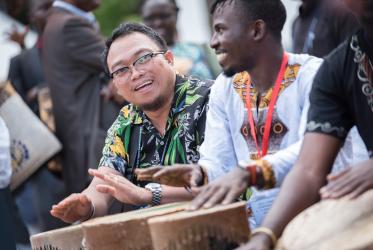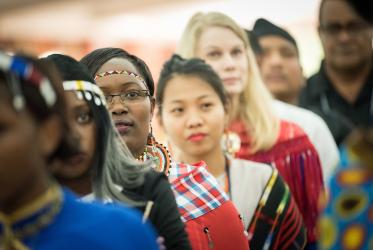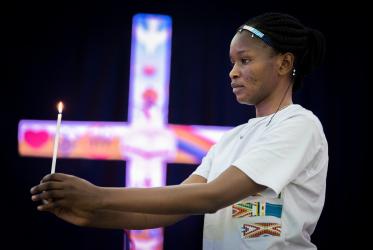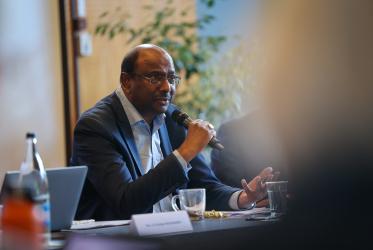As rector of the only ecumenical theological institution in Cuba, Rev. Dr Carlos Emilio Ham is at the forefront of exploring how local churches can engage in empowering diakonia.
In November, he defended and published at the Free University of Amsterdam a thesis entitled “Empowering Diakonia: A Model for Service and Transformation in the Ecumenical Movement and Local Congregations.”
A pastor of the Presbyterian-Reformed Church in Cuba, Ham took some time from his leadership duties at the Matanzas Evangelical Theological Seminary to reflect on his long-standing commitment to diakonia.
“I started realizing that diakonia was important to me when it became relevant for the Cuban churches,” he said. “Before the triumph of the Revolution in 1959, most of the historical churches were running significant diaconal projects, particularly in the areas of education and health care.”
Then, in the 1960s, private services were nationalized and conducted by the Marxist state in Cuba and, consequently, the churches no longer performed this task. After the Berlin Wall collapsed, churches’ diaconal missions gained a new momentum in the 1990s up to the present, primarily because of improving relations between the state and the churches. Churches have more freedom to carry out their missions. Diaconal work has also strengthened as the needs of the population have increased due to the economic crisis. As the state decentralized the Cuban economy, the changes challenged civil society in general.
Work at WCC deepened his perspective
Ham served the World Council of Churches (WCC) in Geneva as a programme executive in various areas from 2001 to 2013. He began working in mission and evangelism and was later appointed coordinator of mission and ecumenical formation. “This gave me the opportunity to deepen and strengthen my knowledge and experience, first in the area of mission,” he said. “This for me is paramount, since I am convinced that the missio Dei — God’s mission— is like the umbrella that covers all churches’ activities and ministries.”
Throughout his most recent career, he has worked toward an ecumenical vision while emphasizing theological education and diakonia, both globally and locally. “Now, in our seminary, we are reinforcing these areas in order to better prepare our pastors and leaders for the current and future challenges that the Cuban churches are facing.”
The relationships he forged with his work, particularly related to Latin America and the Caribbean, have also been important, he said. “The contacts that I developed with others are a vital asset for my current work.”
Unique conceptual framework
In his thesis, Ham describes how, in the ecumenical movement in general and in the WCC in particular, while there has been significant work done in the areas of empowerment and diakonia, there is no conceptual framework or basic structure merging these concepts. “In other words,” Ham writes, “what is being missed is a coherent reflection or a comprehensive way of thinking that binds together both empowerment and diakonia in a system that can provide a fresh and relevant vision for the diaconal endeavour.”
This is a critical issue, Ham believes, because ultimately churches need to become self-sustaining for diaconal engagement. “The solution that is being suggested and the way of addressing resourcefully this requirement consists of designing, constructing and proposing the practical implementation of the Empowering Diakonia model,” he writes. “This model synthesizes, combines and binds both concepts together, namely, a new method, using the steps and tools that are described in the thesis. Arguments are made that this model can become an effective way for diaconal engagement today, since it is being built on a concept and practice of diakonia that are both empowered and empowering.”
Ham bases the conceptual platform and methodology of his thesis on the book A Fundamental Practical Theology: Descriptive and Strategic Proposals by Don S. Browning. Browning’s book argues in favour of what the author describes as “the five dimensions of practical reason” or foundational elements that form his understanding of practical theology. These elements are Ham’s starting point to design five dimensions of empowering diakonia, which Ham calls the visional, normative, needs-oriented, contextual and transformative.
“These Five Dimensions are an essential tool not only to interrelate both the theory and practice, but also as a helpful diagnosis instrument for analysis, description and interpretation,” he writes. “In other words, they can be a useful mechanism for articulating an understanding of both diakonia and empowerment, moving from practice to theory and back to practice, in order to ultimately design the Empowering Diakonia model.”
The thesis consists of six chapters and is guided by four main research questions: First, how has the WCC contributed to the development of the concepts of diakonia and empowerment throughout its history? Second, what can we learn from local experiences and practices with regard to diakonia and empowerment? Third, how can we respond to the need to bridge gaps between theory and practice, in relation to diakonia and empowerment, by designing the Empowering Diakonia model? Fourth, How can we implement this model in the ecumenical movement, and more intentionally in the local congregations?
At the heart of Ham’s research is his design of the Empowering Diakonia model as a new pragmatic and operational method for service and transformation in the ecumenical movement.
Sharing his research
Ham is already applying his newly published research to his work at the seminary. As he co-facilitates the Cuban School for Diakonia, he believes the model he proposes can help churches further facilitate a diaconal mission in order to empower the people to be subjects of transformation of the Cuban society.
“My vision is that this transformation will lead to koinonia, to a community beyond the narrow boundaries of the church. Diakonia, therefore, is not an end in itself, but rather an instrument used by God, together with others, to build an inclusive and just community, an oikos, a household in which the entire creation is included, enjoying the fullness of life intended for all.”
Documents related to the WCC’s programme in diakonia









